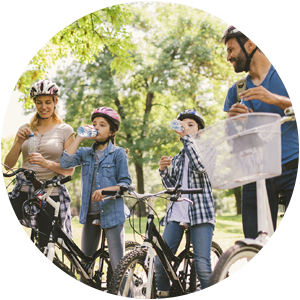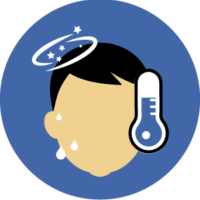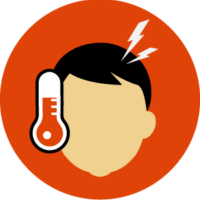
Prepare to Beat the Summer Heat!
It might still be spring, but our community is already experiencing summer temperatures! While the warmer weather can encourage us all to get back outdoors and enjoy our favorite recreational activities like running, hiking, biking, or swimming, it's also important to be mindful of heat-related illnesses, like heat exhaustion and heat stroke, that can affect anyone this time of year.
We know that after a cold and snowy winter, it can be easy to forget about ways to practice heat safety, but staying informed on the signs of heat-related illnesses and knowing how to prevent them is the best way to keep ourselves and others safe. That's why we want to offer a few safety tips and reminders to keep your fun under the sun safe. Let's talk about ways we can protect our health as we head into summer and continue to enjoy all this beautiful spring weather!
What are the signs of heat exhaustion and heat stroke?
One of the best ways to prepare for warmer weather is to learn the symptoms of heat exhaustion and heat stroke. This can help you determine the best way to take action and prevent further heat-related complications. Let's break it down.

Heat Exhaustion:
Heat exhaustion occurs from playing, working, or spending long periods of time in the sun with little to no water. If you’re dehydrated, you have less water to sweat out to keep your body cool. This can lead to symptoms of heat exhaustion which include pale or clammy skin, body weakness, nausea and/or vomiting, headaches, and feeling lightheaded or dizzy.
If you think someone may be experiencing heat exhaustion, it's important to move the individual to a shady area if you're outside or head indoors if you can. Remove any unnecessary clothing, like shoes and socks, and put a damp wash cloth on their neck and/or forehead to reduce their body temperature. If you’re indoors or near a water source, like a water fountain, encourage the individual to drink water too.

Heat Stroke:
Heat stroke is a medical emergency that occurs when symptoms of heat exhaustion are not treated. Symptoms include skin that is dry and hot, a body temperature above 104° F, feeling confused or dazed, loss of consciousness, nausea and/or vomiting, and fast breathing with a rapid heart rate. If you suspect someone may be experiencing heat stroke, call 911. Heat stroke can cause organ failure, brain damage, and even death if not treated immediately.
How can we help prevent heat related illnesses?
There are plenty of ways to keep your fun in the sun safe. Now that you know how to recognize and respond to heat-related illnesses, let's talk about ways we can help prevent them. Here are a few tips to protect your health before heading outdoors to enjoy the sun:
- Drink plenty of water if you plan to be outdoors and make sure kids and pets have plenty of water too.
- Apply sunscreen at least 15 minutes before going outside to prevent sunburns and protect your skin from the sun’s UV rays.
- Consider planning outdoor activities for the morning or evening when the temperatures are likely to be cooler.
- Take breaks when playing in the sun and find a shady area where you can rest and cool off.
- Call 211 to find a cooling center in your area if you don't have access to air conditioning in your home.
- Never leave infants, children, people needing mobility assistance, or pets in a parked car even with the windows partially opened.
- Check on neighbors, friends and family who may be at greater risk of heat-related illness.
Let’s Beat the Heat Together!
Warm weather arrived quickly this year, so preparing now for extreme heat is important. We want everyone in our community to enjoy their time outdoors and make the most of their summer fun, but we also want to make sure you have a chance to do it safely.
By incorporating heat safety into your summer activities and keeping an eye out for others, especially older people and younger children, we can help keep everyone in our community safe as we take on another summer in Spokane! For more information and resources on heat safety, visit: Extreme Heat | SRHD
Recently, the Gonzaga Center for Climate, Society, and the Environment has been conducting heat research in the Spokane community. If you would like to learn more, visit Spokane Heat Maps at: https://ow.ly/eRoH50OJEPt
